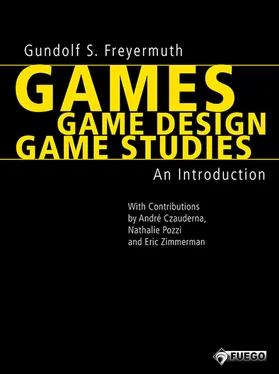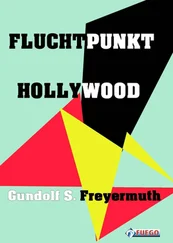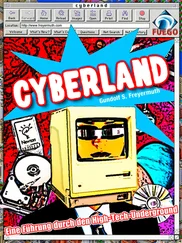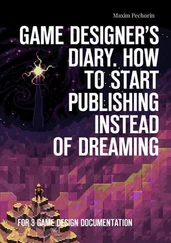1 ...6 7 8 10 11 12 ...17 Q10. Games are closed, formal systems.” 12
From these characteristics Schell arrives at his own definition: “A game is a problem solving activity, approached with a playful attitude.” 13
FAILURE OF SYSTEMATIC DEFINITIONS
What these diverging efforts to systematically define the object of game design theory and Game Studies have in common is that they all fail equally when confronted with the reality of digital games and the current status of aesthetic theories. Frans Mäyrä and Egenfeldt-Nielsen et al. have pointed out that the majority of circulating definitions disregard newer game types, such as simulations, MMORPGs (Massively Multiplayer Online Role-Playing Games), or open-world and sandbox games, in the name of establishing coherent definitions. 14In the context of the history of theories, these ontologically-oriented attempts and their utilitarian search for definitions prove themselves bound to the normativity of pre-modern poetics. Thus, from the perspective of aesthetic theory, they seem equally backwards and futile. Insofar as digital games are aesthetic constructions, whose contents are underlain by forms of social and cultural change, all efforts to arrive at an ahistorical, systemically normative definition seem destined to fail from the outset. Advanced artistic production in modern times, after throwing off the chains of religion and tradition, has to approach the evolving lifestyles, topics, and contradictions of its time in new ways, again and again—it knows little of exemplary rules, the relevance of which are timeless. Like works of literature or the fine arts, like theatre plays or movies, digital games can be reduced to single concepts solely from a historical perspective. 15
At present such a view should focus on the understanding of the categorical difference between analog and digital media and, thereby, on the conceptual and historical separation of analog and digital games. Most attempts at systematic definition, however, hardly take such a differentiation into consideration. 16Jesper Juul admittedly recognizes a historical development—since the 1970s games have arisen that no longer fit into the “classic game model.” 17But in his analyses he purposefully does not differentiate between analog and digital games. Rather, he understands the latter simply as “continuations of a history of games that predate these [video games] by millennia.” 18Salen and Zimmerman target this non-differentiation even more directly:
“The definition of ‘game’ that we proposed in the previous chapter makes no distinction between digital and non-digital games—the qualities that define a game in one media (sic!) also define it in another.” 19
HISTORICAL DEFINITION:
THE ALTERITY OF DIGITAL GAMES
By contrast, I will argue for a twofold alterity of digital games. This otherness aims at more than the drastic technical and aesthetic disparities between, say, a board-game like Trouble and a first-person shooter, such as TITANFALL (2014). That these differences alone render an attempt at a common definition questionable is hardly a new insight. Frans Mäyrä writes, for example, of “specific forms into which digital games and their playing have evolved during the last decades” 20: “As games have moved from streets and living room tables into various computer systems, the associated activity has also altered its character, or, at least, gained different dimensions.” 21His argument for the “specificity of digital games” focuses particularly on the moment of their dependence on audiovisual technology: “The absolute majority of digital games is based on screens of various kinds.” 22
To others, however, such a perspective seems bound to surface similarities, since analog and digital contents are of totally different medialities, even if they appear on the same screens. Dieter Mersch, for instance, writes: “At first sight we seem to be dealing with audiovisual phenomena, which, however, have starkly separated themselves from film or video as they are different not just technologically and mathematically, but in fact in every way.” 23Mersch’s “media theory of the digital game” defines their specificity as their dependence on decision logic: “It determines the foundations of games and sets the mathematical frame of their programs.” 24Mersch indicates thereby a difference of digital games mainly from older audiovisual media. 25
Alterity, however, designates more than any arbitrary differences, no matter how peripheral or fundamental they may be. The Latin “alter” describes—for example in the term alter ego or in the words alternative and alternating—a particular other: an other, which stands in a specific and describable relation to a first, a related other. Insofar as “alter” implies a binary relationship, it has to do with (1) the philosophical-historical discussion of the term “alterity” regarding the relationship of an individual or subject to another individual or subject, (2) the relationship between races (considerably in the context of modern relations of Jews and non-Jews as well as postcolonial relations of whites and non-whites), and (3) the relationship between genders. Thus, in the second half of the 20th century, a thread of philosophizing about alterity ran from Emmanuel Levina’s contemplations on the radical alterity of death, which is always experienced as the dying of another, 26to the reflections of his friend Jacques Derrida on memory and sorrow as a destruction of the alterity of the other through internalization. 27Next, trains of thought on the postmodern disposition of media, especially Jean Baudrillard’s work, focused on the fears that medial and networked audiovisual communication in particular—from television to the World Wide Web—would destroy the experience of otherness of subjects and cultures. 28These texts in turn influenced modern gender theory. Judith Butler, for example, understands alterity as “the constitutive outside,” 29against which the respective inside forms itself and finds its identity.
By adapting the term alterity in order to make what it structurally contains fruitful for the historical theory of media, the first half of my assumption claims that digital games are not something entirely different from analog games, but rather that digital games are the specific other of analog games . As a medium, digital games form themselves through their indispensable intermedial relation to the medium of analog games. Only through this experience of alterity were digital games able to find their identity over the course of several decades. The second half of my assumption claims the same relationship—the dichotomous relationship of identity and alterity—between digital games and the linear audiovisions of cinema and television: that digital games are neither the same as nor radically different from linear audiovisions, but that digital games are the specific other of linear audiovisions.
1Cited in Salen, Katie/Zimmerman, Eric: The Game Design Reader: A Rules of Play Anthology , Cambridge, Mass.: MIT Press 2006, p. 78.
2Fullerton, Tracy. Game Design Workshop , loc. 1638.
3McGonigal, Jane: Reality Is Broken: Why Games Make Us Better and How They Can Change the World , New York: Penguin Press (Kindle edition) 2011, loc. 375-389.
4Huizinga, Johan: Homo Ludens: A Study of the Play Element in Culture , Boston: Beacon Press (Kindle edition) 1955 (*1938).
5Caillois, Roger: Man, Play, and Games , New York: Free Press of Glencoe 1961.
6Avedon, Elliott M./Sutton-Smith, Brian: The Study of Games , New York: J. Wiley 1971; Sutton-Smith, Brian: The Ambiguity of Play , Cambridge, Mass.: Harvard University Press 1997.
7Salen, Katie/Zimmerman, Eric: Rules of Play: Game Design Fundamentals , Cambridge, Mass.: MIT Press (Kindle edition) 2003, loc. 934.
Читать дальше











